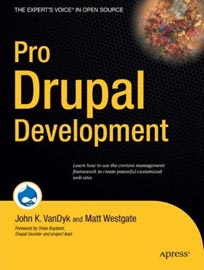Drupal's Must-Read Sensation!
One of the major pet peeves of myself and many others who strive to use open-source software on a regular basis is the lack of documentation. Sure, installing it out of the box is well-documented, but modifying it besides downloading plug-ins/modules is rarely documented. Sometimes there's a nice API, but how does one get from not knowing anything about the system to just needing to know the exact syntax for a certain function?
 I don't have the time to do the full book review, but let me just say that the brand-new book Pro Drupal Development by John VanDyk and Matt Westgate is really an indispensable book. There really is no way, short of reading through Drupal's code and asking a core developer what this file does, to find out the things you will learn in this book.
I don't have the time to do the full book review, but let me just say that the brand-new book Pro Drupal Development by John VanDyk and Matt Westgate is really an indispensable book. There really is no way, short of reading through Drupal's code and asking a core developer what this file does, to find out the things you will learn in this book.
The book, published by Apress, breaks down the major functionalities of Drupal in easy-to-swallow chapters. I'm just on Chapter 9, but already I've learned tons about how to theme Drupal, how to write my own modules, and much, much more. There are plenty of code examples throughout the book. The book reads well but also works as a good reference.
In short, if you want to start using Drupal as your content management system of choice and want to make the most of it, get this book. You won't regret it, and it's not too expensive either. Also, props to Apress for giving free copies to the Drupal Summer of Code participants!
After this read, I think I'll be ready to finally make that kick-butt music site that I've been hyping up for years. It's going to happen.
Add new comment